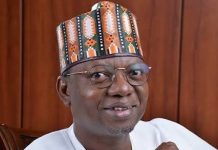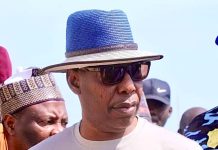
For months, the Presidency spokespersons and top officials of Nigeria’s government talked up with childish relish about the imminent arrival of the American-made and supplied Super Tucano fighter jets purchased at a whopping sum of $494 million. Even recently, a parliamentary delegation travelled to the United States to have a look at the jets before they are delivered to Nigeria, despite that Americans have blatantly refused to have Nigerian technicians trained for the maintenance of the jets or have them in the production crew.
Yet, a parliamentary delegation set off for the US with public funds to have a mere look at the colour of the jets, before they arrive in Nigeria. Well, the point is the omnipotence and invincibility ascribed to American-made weapons and Nigerian officials who fetishise and even worship it far beyond its actual potency. And here is where America’s Afghan debacle is of supreme lesson to those who do actually wish to learn. For the past 20 years, the United States with a fringe or sprinkle of their NATO allies built the Afghan 350,000 strong military force from the scratch and equiped it, a venture estimated at more than $150 billion.
Yet, just as the United States of America was cutting and running, by abruptly ending its military mission in the country, barely a month ago, the resurgent Taliban rallied its forces, without an air cover and began taking province after province until it strolled into the Afghan presidential palace, with the America’s propped up and protected regime collapsing like pack of cards and its henchmen fleeing in different directions. Former President, Mr. Ashrsf Afghani, released a recorded speech before fleeing the country.
Meanwhile, the situation at the Kabul international airport resembled chaotic scene of Saigon, Vietnam in 1975, when the America propped regime of Mr. Nguyen Van Thieu in the South Vietnam also collapsed with its henchmen scampering to flee the country from the roof of the US embassy. American allies in the NATO have been fulminating at the untidy exit of the American forces in Afghanistan which created the immediate pathway for the return of the Taliban. The chaotic exit, without adequate consultations with its NATO allies, is why Washington is not quite good for an ally but a pragmatic and useful partner engaged for a targeted cooperation and specific areas or fields of mutual benefit.
Earlier on July 8, President Joe Biden soon after the American forces withdrew from the Afghan Bagram Air base, which served as its hub in the 20 year-old war in Afghanistan, declared that: “The Taliban is not the North Vietnamese Army. They are not remotely comparable in terms of capability. There is going to be no circumstance where you see people being airlifted off the roof of the embassy of the United States from Afghanistan”, in reference to Saigon, the former Vietnamese capital that Americans have to hurriedly evacuate after the puppet regime they installed, collapsed under the determined military onslaught of the Vietnamese army led General Vo Nguyen Giap and under the political leadership of the legendary Ho Chi Minh.
But like the Saigon incident, where American personnel and others would climb to the roof of the US embassy building to board a helicopter that could not find a landing space on the Vietnamese soil in 1975, history repeated itself as the US embassy in Afghanistan had to hurriedly relocate to the Kabul international airport, from where its personnel and others scampered to escape through waiting aircraft. By August 15, the Taliban fighters were swarming the gold-drapped presidential palace, following the collapse of the US puppet regime and helping themselves to assorted meals left behind by the fleeing regime hench persons.
Taliban is not all the Afghans have known. The Saur Revolution of 1978, following the end of the reign of King Mohammed Zahir, ushered in modest socialist reforms, including reforms depriving rich mullahs of cheap labour, instituting wide-ranging women’s rights and equality which, of course, angered the conservative upper echelon of the Afghan society. President Mohammed Najibullah who took office from 1986 and lasted till 1992 when the American and Pakistan backed Mujaheddin toppled him, had earlier provided a framework for national reconciliation through forming an inclusive government, holding out an olive branch to the Mujaheddin, instituting a multi-party system, and deleting any reference to communism in the constitution, while Islam became the state religion. These measures could not, however, appease the Mujaheddin and their U.S backers.
Having been overthrown and refused exit from the country, Najibullah who lived in the United Nations compound in Kabul for four years was actually captured by the Taliban, tortured to death, and his body dragged in a truck through the city of Kabul. Thereafter, his body and that of his brother were hanged from a traffic light pole outside the presidential palace. It is no wonder that former President Afghani took to his heels before the Talibans could close up on the presidential palace on August 15 and is now cooling his heels in the United Arab Emirate where, along with his family, he has been granted political asylum.
Taliban, which means students or seekers, first emerged in 1994 as one of the factions in the Afghan civil war and mostly consisted of students (Talib) from the Pashtun areas of Eastern and Southern Afghanistan who have been educated in traditional Islamic schools. The Pakistan Inter-Agency Service, ISI, its powerful military intelligence, is well known to have helped politicise and radicalise the former Afghan Koranic students whose resilience and military dexterity owes much to its connections with Islamabad.
Until the Taliban made the fatal decision to host Osama Bin Laden, the alleged perpetrator of the 9/11 heist in the US, Washington had not always been averse to Taliban as its monies and weapons that generously flowed to the Mujaheddin also greased the palms of the Taliban. As it is currently, evidence abound from the regime-change failure in Syria to the chaos in Libya and Iraq, and now ultimately capped with Washington’s capitulation in Afghanistan that US military invincibility is grossly exaggerated.
Last April, Nigeria’s enlightened community was terribly shocked when President Buhari provocatively and naively requested that Washington relocate its Africa high Command, the military base from Stuggart, Germany to Africa to contain terrorist threats, for which the Americans pointedly declined. The US which is still a sole ‘hyper power’ is undoubtedly militarily formidable and incurring its wrath can be forbidden in many implications, but brandishing American power as an all-time fixer of all problems, including military solutions to local challenges like terrorisms and insurgencies, is surprisingly naive and a blundering non-starter.
America was not defeated in Afghanistan, as the debacle may have erroneosly suggested. The “gringoes” as the South Americans like to call their giant neighbour, simply cut and run as any survival instinct would dictate and in the best tradition of national interest, leaving the Afghans, like the Libyans and Iraqis to sort out the mess.
Onunaiju is research director of Abuja based think tank












